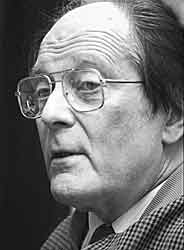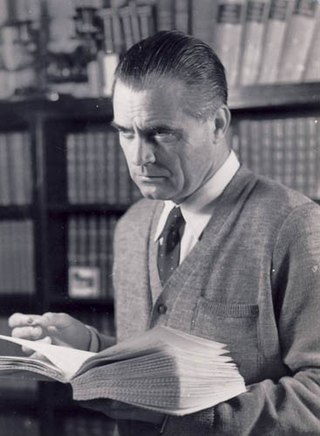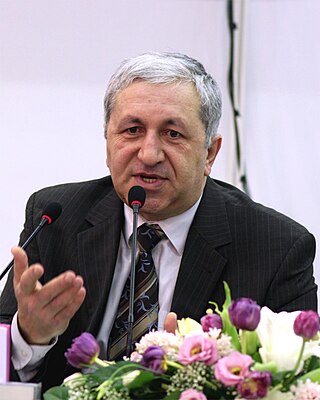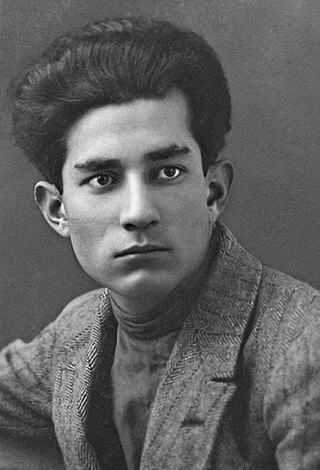Related Research Articles

Aleksandr Isayevich Solzhenitsyn was a Russian writer. A prominent Soviet dissident, Solzhenitsyn was an outspoken critic of communism and helped to raise global awareness of political repression in the Soviet Union, in particular the Gulag system.

Russian literature refers to the literature of Russia and its émigrés and to Russian-language literature. The roots of Russian literature can be traced to the Middle Ages, when epics and chronicles in Old East Slavic were composed. By the Age of Enlightenment, literature had grown in importance, and from the early 1830s, Russian literature underwent an astounding golden age in poetry, prose and drama. Romanticism permitted a flowering of poetic talent: Vasily Zhukovsky and later his protégé Alexander Pushkin came to the fore. Prose was flourishing as well. Mikhail Lermontov was one of the most important poets and novelists. The first great Russian novelist was Nikolai Gogol. Then came Ivan Turgenev, who mastered both short stories and novels. Fyodor Dostoevsky and Leo Tolstoy soon became internationally renowned. Other important figures of Russian realism were Ivan Goncharov, Mikhail Saltykov-Shchedrin and Nikolai Leskov. In the second half of the century Anton Chekhov excelled in short stories and became a leading dramatist. The beginning of the 20th century ranks as the Silver Age of Russian poetry. The poets most often associated with the "Silver Age" are Konstantin Balmont, Valery Bryusov, Alexander Blok, Anna Akhmatova, Nikolay Gumilyov, Sergei Yesenin, Vladimir Mayakovsky, and Marina Tsvetaeva. This era produced some first-rate novelists and short-story writers, such as Aleksandr Kuprin and Nobel Prize winners Ivan Bunin, Leonid Andreyev, Fyodor Sologub, Yevgeny Zamyatin, Alexander Belyaev, Andrei Bely and Maxim Gorky.

The brothers Arkady Natanovich Strugatsky and Boris Natanovich Strugatsky were Soviet-Russian science-fiction authors who collaborated through most of their careers.

Jaan Kross was an Estonian writer. He won the 1995 International Nonino Prize in Italy.

Chinghiz Torekulovich Aitmatov was a Kyrgyz author who wrote mainly in Russian, but also in Kyrgyz. He is one of the best known figures in Kyrgyzstan's literature.
Albanian literature stretches back to the Middle Ages and comprises those literary texts and works written in Albanian. It may also refer to literature written by Albanians in Albania, Kosovo and the Albanian diaspora particularly in Italy. Albanian occupies an independent branch within the Indo-European family and does not have any other closely related language. The origin of Albanian is not entirely known, but it may be a successor of the ancient Illyrian language.

Zaharia Stancu was a Romanian prose writer, novelist, poet, and philosopher. He was also the director of the National Theatre Bucharest, the President of the Writers' Union of Romania, and a titular member of the Romanian Academy.

Corrado Alvaro was an Italian journalist and writer of novels, short stories, screenplays and plays. He often used the verismo style to describe the hopeless poverty in his native Calabria. His first success was Gente in Aspromonte, which examined the exploitation of rural peasants by greedy landowners in Calabria, and is considered by many critics to be his masterpiece.

Oleksandr "Oles" Terentiiovych Honchar was a Soviet and Ukrainian writer and public figure. He also was a veteran of World War II and member of the Ukrainian parliament.
Otar Chkheidze Georgian writer, literary man, PhD (1949).

Vyacheslav Repin is a French writer of Russian extraction, born 1960 in Tomsk (Siberia). He writes in French and Russian and is the author of novels, short stories and essays.

Shapi Magomedovitch Kaziev was a Russian writer, playwright and script writer. Avar by ethnicity, he was the author of historical novels and other books.
Eliezer Steinman was a Russian-born Israeli writer, journalist and editor.

Ion Ciobanu was a writer and politician from Moldova. He served as the head of the Moldovan Writers' Union (1961–1965).

Mehdi Ali oglu Huseynov – famed under the pseudonym Mehdi Huseyn was an Azerbaijani and Soviet writer and critic, laureate of the State Stalin Prize of the third degree (1950) and member of the All-Union Communist Party since 1941.

Yuriy Mykolayovych Shcherbak is a Ukrainian writer, screenwriter, publicist, epidemiologist, politician, diplomat, environmental activist and political analyst. Doctor of Medicine (1983), Laureate of Y. Yanovsky Literary Prize (1984) and O. Dovzhenko State Prize (1984).
Kamran Nazirli is an Azerbaijani writer, dramatist and translator. He is a member of the Azerbaijani and Belarus Writers' Union and Journalists' Union of Azerbaijan. He was awarded with the Prize of H.B. Zardabi, the founder of the Azerbaijani National Press, Rasul Rza Prize for literature.

Andrei Evgenievich Gusev is a Russian writer and journalist. He is the author of 10 inventions, 23 published scientific works. One of his co-authors is a winner of the Nobel Prize, a legend of the Soviet physics, the academician Alexander Prokhorov.

Vladimir Ivanovich Ulanov is a Russian writer, journalist, member of the Russian Union of Writers, IFRW and International Union of Writers.
References
- ↑ "Modern Russian Writers". Src-h.slav.hokudai.ac.jp. Retrieved 2022-08-15.
- ↑ Lanin, Boris (January 2011). "Experiment and Emigration: Russian Literature, 1917-1953". Policy.
- ↑ Урал. Свердловское книжное изд-во. 2003.